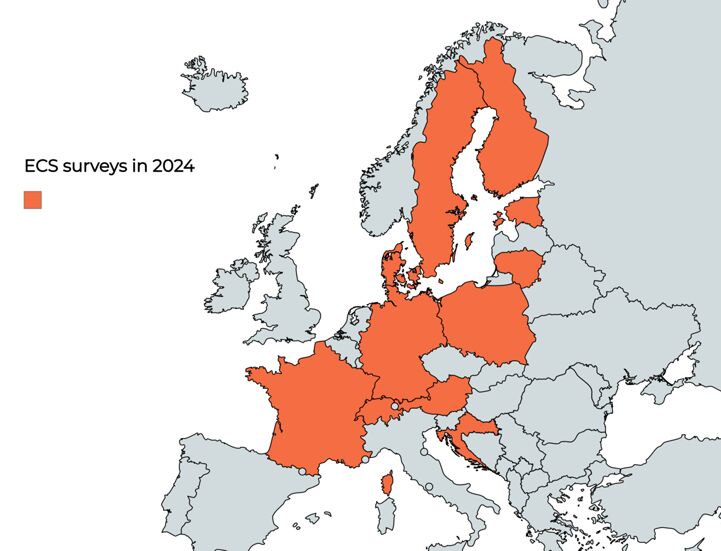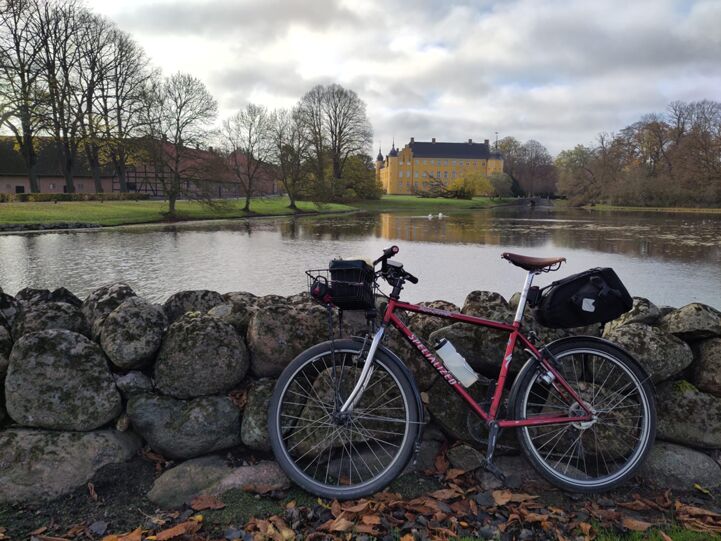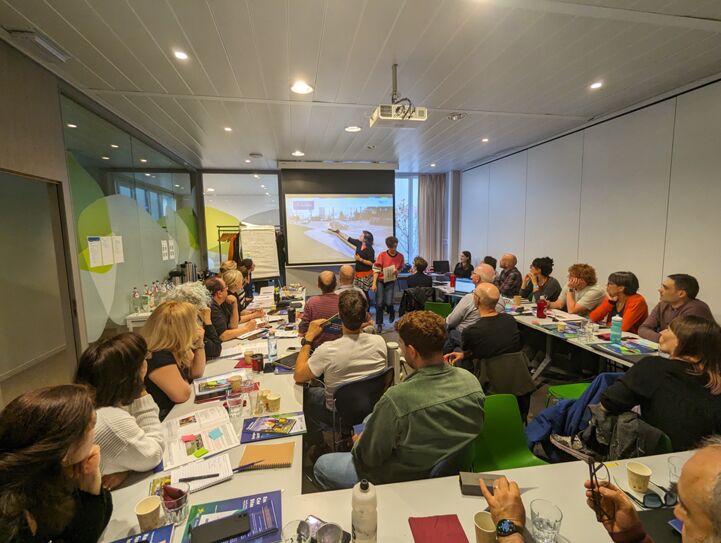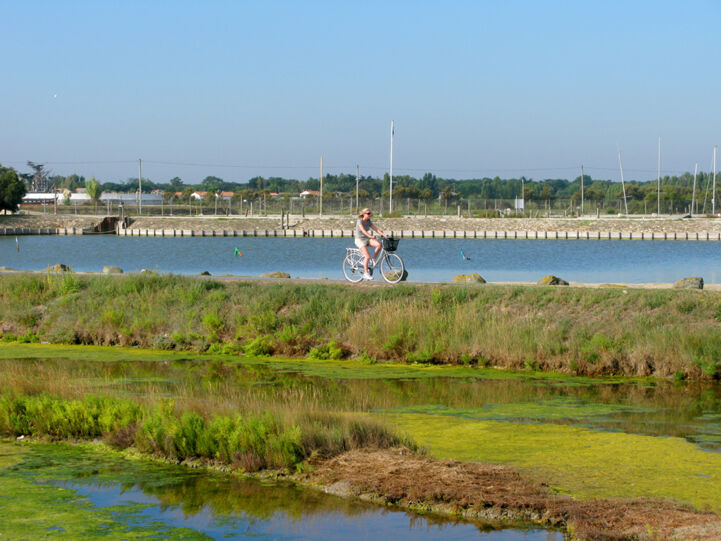A record year for the European Certification Standard!
ECS surveys conducted in 11 countries, a record attendance to the EuroVelo Route Inspector Training, new purchased licenses for the ECS app, two (re)certification processes, collaboration with Japanese partners on the methodology’s intellectual property and the ECS core principles as part of the UNECE group of experts on cycling infrastructures deliverables. Let’s have a look back at what happened in 2024 and the reasons behind this growing interest!
ECS surveys in eleven countries
2024 was the opportunity for many EuroVelo Route Inspectors to implement the European Certification Standard (ECS) methodology on the field and to get knowledge about the quality of cycle routes in their countries. ECS surveys were conducted in eleven countries: Austria, Croatia, Switzerland, Germany, France, Lithuania, Sweden, Denmark, Poland, Finland and Estonia.

EuroVelo 10 – Baltic Sea Cycle Route was the topic of a particular focus as the Baltic Biking Upgrade (BBU) project, co-funded by the Interreg South Baltic Programme, integrates an activity on updating route surveys done within the 2018 Biking South Baltic project to evaluate the progress made, in accordance with the ECS methodology. The consolidated results of this evaluation process will be made available in 2025.

While BBU is limited to the southern section of EuroVelo 10, the Bike Across the Baltic project (Interreg Baltic Sea Region Programme) offered the opportunity for EuroVelo Route Inspectors to survey the route further North in Finland, Sweden and Estonia to complete the picture.
During the summer, ECF was commissioned to survey 60% of EuroVelo 15 – Rhine Cycle Route in order to check the quality of the route and prepare the application for re-certification of the route in 2025. EuroVelo 15 – Rhine Cycle Route was the first route to receive the EuroVelo Certification label in 2014 and its status was renewed already twice! More than 1,400 km in Switzerland, Baden-Württemberg, Hessen and Rhineland-Palatinate were covered. Results will be announced next year.
As there are ongoing licenses for the use of the ECS app in five countries/regions – West Pomerania (Poland), Austria, Croatia, France and Slovenia – we will surely be hearing more about ECS in the coming years.
Almost 60 certified EuroVelo Route Inspectors in 2024
The first-ever EuroVelo Route Inspector Training took place in 2015. This year, we reached new highs with a record number of 59 (re)certified inspectors. In total, there have been 255 inspectors trained in almost ten years!
We started 2024 with the online Refresher Course, intended only for already trained inspectors. This online course offers a unique opportunity for the inspectors to refresh and update their knowledge on the methodology and use of the ECS app, as well as to renew their certification, which is valid for five years. The registrations for the 2025 Refresher Course are already open – do not miss it as it will include new modules focusing on survey preparation and organisation, as well as the analysis of the collected data.

The regular EuroVelo Route Inspector Training takes place in Brussels. This year was again very successful, with 17 countries represented. The EuroVelo Management Team also traveled (by train!) to Kranj, Slovenia, to deliver an ad-hoc training in the frame of the ReMOBIL project. Representatives of six regional development agencies and mobility centres learned about the methodology and how to practically conduct an ECS survey on field surrounded by beautiful mountainous landscapes. Read more about the 2024 training sessions here.
Registration to the 2025 EuroVelo Route Inspector’s training session in Brussels is now open. Bespoke training sessions can be arranged by contacting the EuroVelo Management Team: [email protected]
Celebrating the EuroVelo Certification of the Atlantic Coast Route in France

Another big news is that EuroVelo 1 – Atlantic Coast Route in France, also known as La Vélodyssée, was awarded the EuroVelo Certification thanks to the collective efforts of many stakeholders involved, at the national level or more locally.
The route, running from Roscoff to Hendaye for 1,300 km, has seen many cycling infrastructure improvements and new cycling-friendly services over the past five years, thanks to exemplary coordination at different levels and an excellent governance model. The EuroVelo Certification has been a motivation and an accelerator for change, with great end results. Many sections are recommended both to regular and occasional cycling tourists, and a more detailed overview of the ECS quality level reached by every stretch is available in the Certification report.
Congratulations again to La Vélodyssée collective and their partners!
ECS travelling across the world to Japan
An intellectual property license on ECS was signed with Japanese partners at the end of 2023. 2024 was the opportunity to start the work and knowledge exchanges. Eminent Partners Co. Ltd., in collaboration with the Japan Cycle Tourism Promotion Association and local authorities, intends to evaluate Japanese cycle routes using the quality criteria set out in the methodology, and to promote the best scoring routes both domestically and internationally under the label “JapanVelo”. Read more about their project in the interview given by representatives of Eminent Partners last summer.
ECS principles included in UNECE work on cycling infrastructure
The expertise of ECF on how to assess the quality of a long-distance cycle route, summarised in ECS’s methodology, supported the work of the group of experts on cycling infrastructure hosted by UNECE following the Vienna Declaration on a Pan-European Master Plan for Cycling Promotion. In short, the members of the group of experts agreed to consider the cycling skills of the users first of all when defining quality parameters of cycling infrastructure. The ECS logic was also used to come up with proposals of cycle route data features for the International Transport infrastructure Observatory (ITIO). The international focus on more quality cycling infrastructure confirms the relevance of ECS as the most comprehensive and internationally shared methodology to assess the quality of cycle routes. Read ECF’s article to learn more.
Get in touch with [email protected] for any specific request related to ECS.
Author: Alexandra Fournier with contributions from Agathe Daudibon and Jessica Casagrande
